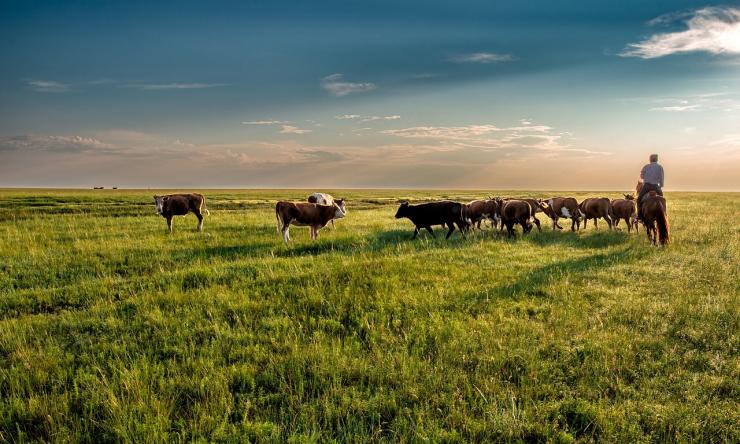CoRSIVs, first discovered in humans, now found in cattle
A study published in Genome Biology opens new possibilities to improve production efficiency in the cattle industry and potentially animal agriculture more broadly. A team of researchers at Baylor College of Medicine, Cornell University and the USDA discovered that, like humans, cattle have CoRSIVs. CoRSIVs are regions of the genome carrying chemical markers on the DNA that provide information that may allow farmers to predict and select desirable cattle characteristics, such as milk production, female fertility and resistance to disease.
“Most people know that each person has a unique set of genes or genome, but less known is that the expression of those genes is regulated by a system of molecular markings on the DNA – epigenetics – that tells different cells in the body which genes to turn on or off,” said co-corresponding author Dr. Robert A. Waterland, professor of pediatrics – nutrition at Baylor’s USDA/ARS Children’s Nutrition Research Center. “We focus on DNA methylation – the addition of methyl groups, the most stable epigenetic mark. DNA methylation differences between people can affect their risk of disease.”
In 2019, Waterland and his colleagues discovered that the human genome contains special regions called CoRSIVs – correlated regions of systemic interindividual variation. At CoRSIVs, levels of DNA methylation differ among people but are consistent across the different tissues within each person. This means that CoRSIV methylation can be measured in easily accessible tissues like blood, providing information on epigenetic regulation in internal organs like the brain, ovaries or liver.
Their earlier work reported nearly 10,000 CoRSIVs in the human genome and proposed that studying these novel regions is a powerful way to uncover epigenetic causes of disease. Indeed, CoRSIVs have already been associated with diverse health outcomes including cancer, thyroid function, cognition, type 2 diabetes, cleft palate, schizophrenia, childhood obesity and autism spectrum disorder.
In the current study, the researchers investigated whether cattle also have CoRSIVs. The team analyzed whole-genome DNA methylation sequencing data on multiple tissues of each of two Holstein cows. “The algorithm we developed indicated that cattle do indeed have CoRSIVs,” said first author Wen-Jou Chang, bioinformatics analyst in the Waterland lab. “Even more exciting, we showed that cattle CoRSIVs share major hallmarks with those in humans, suggesting CoRSIVs are likely present in other mammals. The race is on to find them in other species, such as horses and pigs.”
“We validated our computational findings by laboratory analysis of liver, kidney, brain and blood tissues from 20 different Holstein calves to confirm some of the CoRSIVs Wen-Jou identified,” said Waterland, a member of the Dan L Duncan Comprehensive Cancer Center at Baylor. “This independent validation added great strength to the study.”
Co-corresponding author Dr. Yi Athena Ren, assistant professor in the Department of Animal Science at Cornell University, said, “In recent decades, cattle agriculture has focused on genetic selection to achieve substantial advances in milk production. CoRSIVs may offer a new approach to improve the selection of traits that are desirable to the cattle industry in a sustainable way that reduces cost and environmental impacts.”
“Cattle CoRSIVs, like those in people, are established early in life and are stable across the individual’s life,” Waterland said. “In newborn cattle, methylation patterns across subsets of CoRSIVs may be able to predict future performance. They may be associated with specific desirable traits, like abundant milk production, high female fertility, disease resistance or even heat tolerance, helping select individual calves with traits that will lead to increased productivity.”
The researchers showed that, also as in humans, establishment of DNA methylation at cattle CoRSIVs is influenced by the environment of the early embryo. “This suggests that adjusting embryo culture conditions during assisted reproduction may provide opportunities to tailor agricultural outcomes by epigenetic engineering,” Ren said. “In addition to assisting with the selection of desirable traits, CoRSIVs can help understand disease processes and individual variation among cattle. And, if, as we expect, CoRSIVs are a general feature of the mammalian genome, such agricultural opportunities are not limited to cattle.”
Other contributors to this work include Maria S. Baker, Eleonora Laritsky, Chathura J. Gunasekara, Uditha Maduranga, Justine C. Galliou, Joseph W. McFadden, Jessica R. Waltemyer, Bruce Berggren-Thomas, Brianna N. Tate, Hanxue Zhang, Benjamin D. Rosen, Curtis P. Van Tassell, George E. Liu and Cristian Coarfa. The authors are affiliated with Baylor College of Medicine, Cornell University or the Agricultural Research Service – USDA.
Funding for this project was provided by NIH/NIDDK (1R01DK125562), the USDA/ARS.
(CRIS 3092-5-001-059), and startup funding and a Schwartz Research Award from Cornell University.










